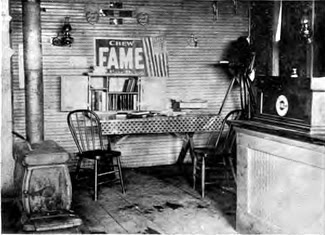According to D.J. McAdam "Wherever he (Napoleon) went he took a library of books with him, and these volumes he had deprived of all superfluous margin, so as to save weight and space. Not infrequently when hampered by the rapid growth of this traveling library he would toss the “overflow” of books out of his carriage window"
The Lighthouse Establishment "furnished to all light vessels and inaccessible offshore light stations with a selection of reading materials. These libraries were contained in a portable wooden case, each with a printed listing of the contents posted inside the door. Proper arrangements were made for the exchange of these libraries at intervals, and for revision of the contents as books became obsolete in accordance with suggestions obtained from public library authorities." A sample listing of books is found at the link above, provided by the Michagan Lighthouse Conservancy.

Of course, Regular Folks couldn't afford their own Traveling Libraries but if they were lucky, they could access one. According to The History of Libraries "Members of the Wisconsin Free Library Commission developed the idea of creating small traveling libraries. J.H. Stout, a library trustee in Menomonie, suggested purchasing quality materials and distributing them in sixteen collections containing 30 volumes each. Each collection was placed in a strong book case with shelves and a lock and key. In addition, a circulation book, rules, and other management materials were included. Circulation began in 1896." You can read about the Free Traveling Libraries in Wisconsin at Open Library.
In Time, instead of shipping just the books in a box, states & counties started driving them around, first on carts, then on autos and eventually on buses. Messy Nessy has some great images and tid-bits regarding mobile books.
The Wisconsin Free Traveling Library link listed above gave example lists, but I confess, I'm a little disappointed not to find lists of what were stocked in those famous libraries of Important People, more so to find such limited lists of what were sent forth to the Common Folks. Of course, I'm spoiled. Being able to pack thousands of titles on a memory card, and thousands more on a drive, I take for granted my *favorites* will always be handy, so long as my WeePC is charged up or I have access to electricity (but that's another story).
Trying to think of carrying 30 to 36 books only, which would you choose - or which would you toss out the window?




No comments:
Post a Comment